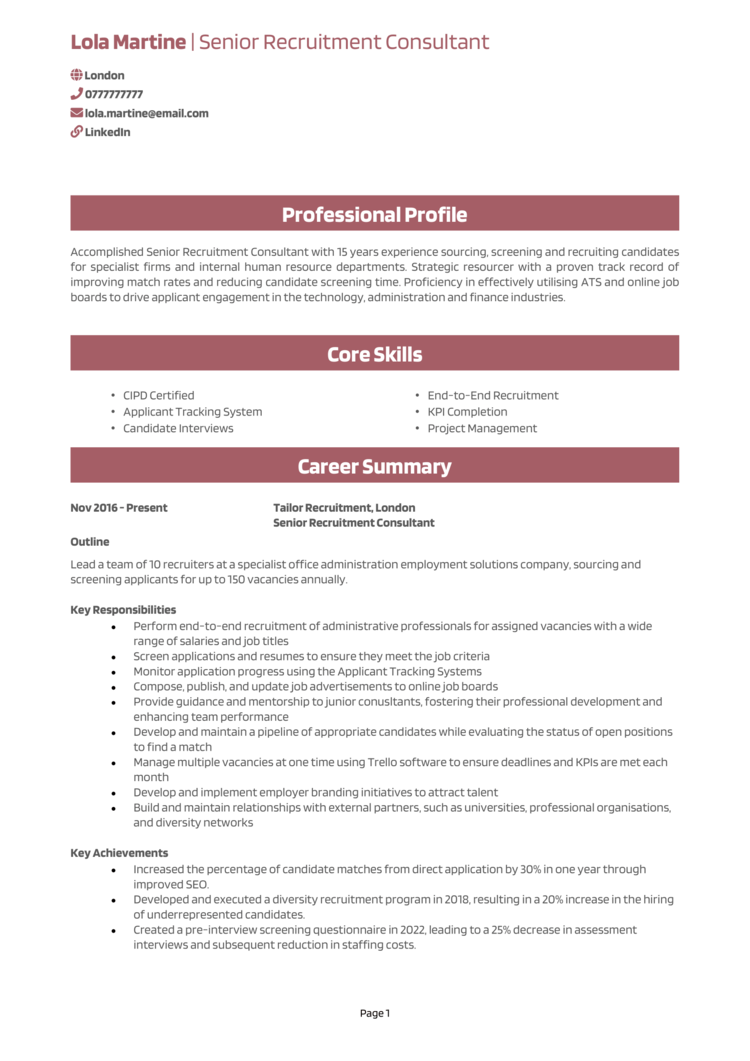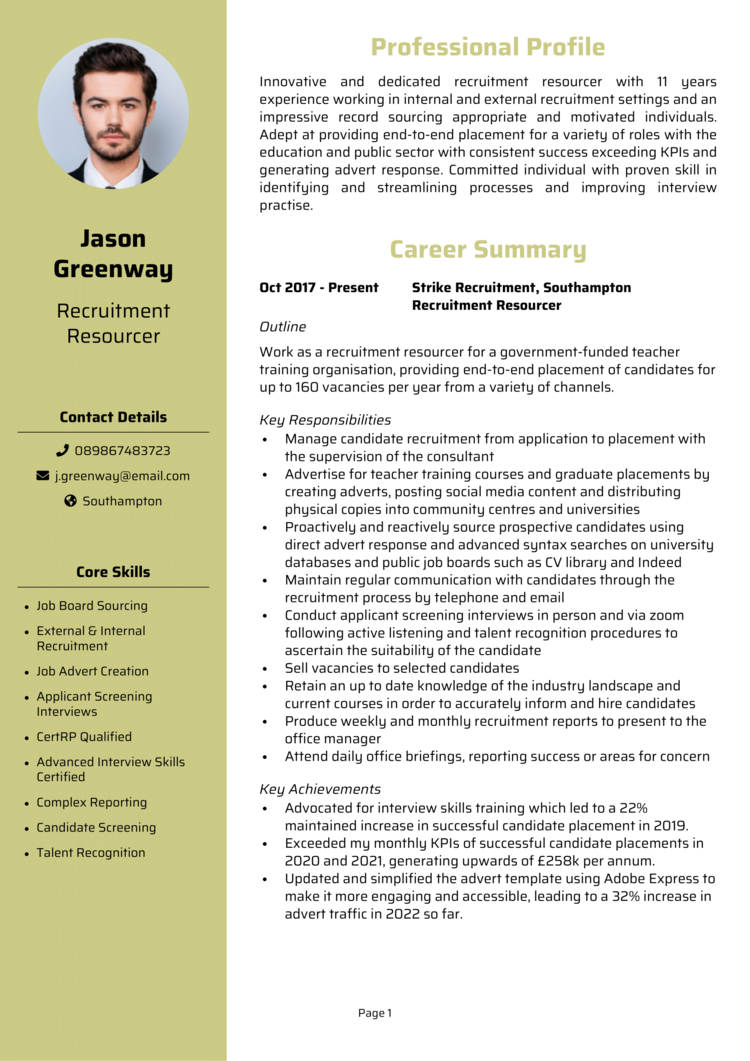As a recruitment consultant, you’re in the business of making great hires – but right now, the only candidate that matters is you. A standout CV won’t just list your experience; it’ll highlight your ability to build relationships and hit targets.
This guide, along with 5 winning Recruitment Consultant CV examples, will help you craft a CV that grabs attention, sells your strengths, and secures interviews.
Recruitment Consultant CV

Senior Recruiter CV

Entry Level Recruiter CV

Recruitment Resourcer CV

Recruitment Coordinator CV

How to write your Recruitment Consultant CV
Learn how to create your own interview-winning Recruitment Consultant CV with this simple step-by-step guide.
This guide covers everything you need to write a CV which effectively highlights your recruitment successes, client management skills, and industry expertise. By the time you’re done, you’ll have an application that proves you’re not just great at finding top talent – you are top talent.
What’s the correct structure for a Recruitment Consultant CV?


You know how hiring managers scan CVs at lightning speed – so why would you expect them to dig through an unstructured, rambling application? Make their lives easy with a clear CV structure (after all, one day you might be recruiting for them too).
Here’s what to include:
- Name and contact details – Keep your personal details at the top where they belong. No recruiter wants to go searching for a phone number! You can add a photo of yourself, but it’s optional.
- Profile – Open with a strong summary that showcases your expertise in candidate sourcing, client management, and sales.
- Core skills – A quick list of your key strengths, whether it’s headhunting, negotiation, or building long-term client relationships.
- Work experience – Highlight your most relevant roles in reverse chronological order, focusing on your ability to place candidates and generate revenue.
- Education – List your degrees and professional certifications in order of relevance.
- Additional info – Optionally note hobbies, Industry memberships, recruitment awards, or additional languages can help you stand out.
Recruitment Consultant CV format


Recruitment is all about making a strong first impression, and your CV’s layout is no exception. If hiring managers struggle to scan it quickly, you might miss out on opportunities, so avoid preventable mistakes in your format.
Stick to these formating principles:
- Bullet points – Use them to highlight achievements clearly and concisely.
- Divide sections – Structure your CV logically for easy navigation.
- Use a clear and readable font – Keep your font professional and avoid anything overly stylised.
- No more than 2 pages – Keep it tight and to the point. If a CV shouldn’t be too long for you as a recruiter, it definitely shouldn’t be too long for your own application.
Creating a strong Recruitment Consultant CV profile


Your CV profile is your 30-second elevator pitch, not a full sales presentation. Get straight to the point – who you are, what you do, and why they should care. This section should instantly show why you’re the recruiter an agency or business needs.
Junior candidates might consider a longer personal statement, which allows more detail.
Recruitment Consultant CV profile examples
Profile 1
Driven Recruitment Consultant with four years of experience in the technology sector, specialising in talent acquisition, candidate sourcing, and client relationship management. Skilled in using LinkedIn Recruiter, ATS systems, and headhunting techniques to identify top-tier talent. Adept at managing the full recruitment lifecycle, from sourcing to placement, while ensuring a seamless experience for both clients and candidates.
Profile 2
Results-oriented Recruitment Consultant with three years of experience in high-volume hiring for the healthcare industry. Skilled in conducting interviews, screening resumes, and negotiating job offers. Proficient in applicant tracking systems such as Bullhorn and Workday. Passionate about matching the right talent with the right opportunities to drive business success.
Profile 3
Experienced Recruitment Consultant with over six years of expertise in executive search and headhunting for financial services firms. Adept at building and maintaining strong client relationships, negotiating contracts, and developing targeted hiring strategies. Skilled in market mapping, talent pipelining, and delivering high-quality candidates for senior leadership roles.
What to include in your Recruitment Consultant CV profile
Taking these tips on board will ensure a solid profile:
- Where you’ve worked – Have you recruited in an agency setting, in-house, or within a specialised sector?
- Your top qualifications – If you’ve completed industry certifications, like those from the REC, mention them here.
- Key recruitment skills – Are you an expert in direct sourcing, employer branding, or high-volume hiring? Make it clear.
- Revenue and hiring success – Show that you don’t just fill roles – you fill them well. Mention your placement rates, client retention, or any targets you’ve smashed.
- Business development – If you’ve grown a client base, expanded into new industries, or developed recruitment strategies, highlight it here.
Core skills section


Think of this section as your quick-hit strengths list. If a hiring manager only had 10 seconds to skim your CV, this should tell them what you excel at.
Customise your CV skills based on the role – an internal recruiter and an agency recruiter will have different priorities.
Key skills that make a Recruitment Consultant CV stand out
- Candidate Sourcing – Identifying and attracting top talent through job boards, networking, and direct outreach.
- Interviewing and Screening – Conducting initial candidate assessments to evaluate skills, experience, and cultural fit.
- Client Relationship Management – Building and maintaining strong relationships with employers to understand hiring needs.
- Job Description Writing – Crafting clear, engaging, and targeted job descriptions to attract suitable candidates.
- Applicant Tracking System (ATS) Proficiency – Using recruitment software like Bullhorn, Greenhouse, or Workday to manage candidate pipelines.
- Negotiation and Offer Management – Managing salary negotiations and employment offers to secure successful placements.
- Market Research and Talent Mapping – Analysing industry trends, salary benchmarks, and workforce demand to advise clients.
- Networking and Business Development – Expanding client and candidate connections through industry events and professional networking.
- Compliance and Employment Law Knowledge – Ensuring all recruitment practices adhere to labour laws, GDPR, and company policies.
- KPI and Performance Tracking – Monitoring recruitment metrics such as time-to-hire and placement success rates to optimise processes.
How to present your work experience on your CV


Recruitment is all about results. Recruiters don’t just want to see that you’ve worked in recruitment; they want to see what impact you’ve had through your work experience.
List your roles in reverse chronological order, but don’t just list responsibilities – show outcomes. If you’ve hit or exceeded placement targets, grown a candidate pipeline, or brought in new clients, this is where you prove it.
How to structure jobs

- Outline – Introduce the company, its sector, and your role within the recruitment team. If you focused on a particular industry or level of hiring, mention that too.
- Responsibilities – Describe what you did daily, from candidate sourcing to account management. Use action words like “headhunted”, “negotiated”, and “secured”.
- Achievements – Highlight the measurable impact you made. Did you exceed hiring targets? Improve candidate retention? Bring in major clients? Use figures to back up your success.
Work history examples for a Recruitment Consultant
Recruitment Consultant | TechTalent Solutions
Outline
Managed the end-to-end recruitment process for tech startups and enterprises, sourcing top-tier candidates for software engineering, data science, and cybersecurity roles.
Responsibilities
- Sourced, screened, and interviewed candidates using LinkedIn Recruiter, job boards, and internal databases.
- Developed strong client relationships to understand hiring needs and tailor recruitment strategies.
- Negotiated salary packages and managed the offer process for successful placements.
- Provided guidance on market trends, salary benchmarks, and hiring best practices.
- Maintained and updated ATS records, ensuring compliance with GDPR and company policies.
Achievements
- Increased successful placements by 30 percent through targeted sourcing strategies.
- Reduced average time-to-hire by 20 percent by streamlining the candidate screening process.
- Recognised as a top biller within the team, exceeding monthly targets consistently.
Recruitment Consultant | HealthRecruiter Ltd
Outline
Specialised in high-volume recruitment within a leading healthcare staffing agency, ensuring a steady pipeline of qualified nurses, doctors, and healthcare assistants for hospitals and medical facilities.
Responsibilities
- Managed job postings, applicant screening, and interview scheduling for healthcare roles.
- Conducted initial candidate assessments, verifying qualifications and right-to-work documentation.
- Liaised with hiring managers to ensure candidates met compliance and credentialing requirements.
- Negotiated contracts and offered support to candidates throughout the onboarding process.
- Maintained long-term relationships with candidates, ensuring high retention rates.
Achievements
- Placed over 100 healthcare professionals within a year, improving hospital staffing levels.
- Reduced candidate drop-off rates by 25 percent by improving engagement and communication.
- Achieved a 95 percent client satisfaction rate through excellent candidate placements.
Recruitment Consultant | Exec Search Ltd
Outline
Conducted executive-level recruitment within a financial services headhunting firm, identifying and placing senior professionals in leadership positions across banking, asset management, and insurance.
Responsibilities
- Head-hunted and engaged senior professionals for C-suite and director-level roles.
- Performed in-depth market research and talent mapping to identify top candidates.
- Managed the full recruitment cycle, from initial outreach to offer negotiation and placement.
- Worked closely with clients to develop hiring strategies tailored to their business needs.
- Provided career coaching and market insights to executive candidates.
Achievements
- Successfully placed 10+ executives in leadership positions within a year.
- Increased client retention by 40 percent by delivering high-quality candidates consistently.
- Generated £500K+ in revenue through retained executive search contracts.
Education section


Your qualifications matter, but recruitment is a results-driven field. Keep this section concise unless you’re applying for an entry-level role where education is a key factor. If relevant, highlight coursework or certifications in HR, sales, or recruitment best practices.
List qualifications in reverse chronological order, starting with the most recent.
Best qualifications for Recruitment Consultants
- Diploma in Recruitment Practice (REC) – A widely recognised qualification for professional recruiters.
- BA/BSc in Business, HR, or Psychology – Degrees that help develop a strong understanding of people, strategy, and sales.
- Advanced Certificate in Employment Law – Useful for recruiters managing compliance-heavy industries.
- Sales and Negotiation Training – A valuable qualification for agency recruiters focused on business development.
- Social Media Recruitment and Employer Branding Certification – Demonstrates expertise in modern recruitment marketing techniques.





